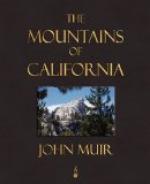He feasts on all the species long before they are ripe, but is wise enough to wait until they are matured before he gathers them into his barns. This is in October and November, which with him are the two busiest months of the year. All kinds of burs, big and little, are now cut off and showered down alike, and the ground is speedily covered with them. A constant thudding and bumping is kept up; some of the larger cones chancing to fall on old logs make the forest reecho with the sound. Other nut-eaters less industrious know well what is going on, and hasten to carry away the cones as they fall. But however busy the harvester may be, he is not slow to descry the pilferers below, and instantly leaves his work to drive them away. The little striped tamias is a thorn in his flesh, stealing persistently, punish him as he may. The large Gray Squirrel gives trouble also, although the Douglas has been accused of stealing from him. Generally, however, just the opposite is the case.
The excellence of the Sierra evergreens is well known to nurserymen throughout the world, consequently there is considerable demand for the seeds. The greater portion of the supply has hitherto been procured by chopping down the trees in the more accessible sections of the forest alongside of bridle-paths that cross the range. Sequoia seeds at first brought from twenty to thirty dollars per pound, and therefore were eagerly sought after. Some of the smaller fruitful trees were cut down in the groves not protected by government, especially those of Fresno and King’s River. Most of the Sequoias, however, are of so gigantic a size that the seedsmen have to look for the greater portion of their supplies to the Douglas, who soon learns he is no match for these freebooters. He is wise enough, however, to cease working the instant he perceives them, and never fails to embrace every opportunity to recover his burs whenever they happen to be stored in any place accessible to him, and the busy seedsman often finds on returning to camp that the little Douglas has exhaustively spoiled the spoiler. I know one seed-gatherer who, whenever he robs the squirrels, scatters wheat or barley beneath the trees as conscience-money.
The want of appreciable life remarked by so many travelers in the Sierra forests is never felt at this time of year. Banish all the humming insects and the birds and quadrupeds, leaving only Sir Douglas, and the most solitary of our so-called solitudes would still throb with ardent life. But if you should go impatiently even into the most populous of the groves on purpose to meet him, and walk about looking up among the branches, you would see very little of him. But lie down at the foot of one of the trees and straightway he will come. For, in the midst of the ordinary forest sounds, the falling of burs, piping of quails, the screaming of the Clark Crow, and the rustling of deer and bears among the chaparral, he is quick to detect your strange footsteps, and will




